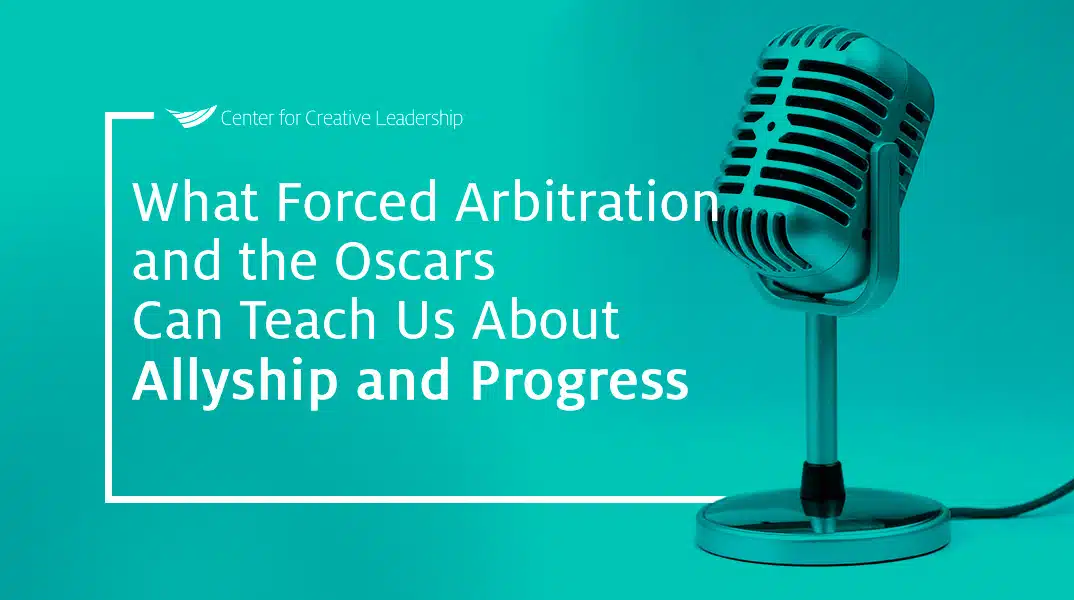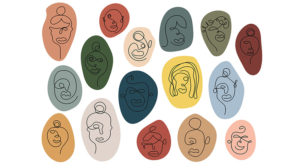- PODCAST
Lead With That: What Forced Arbitration and the Oscars Can Teach Us About Allyship and Progress

In this episode of Lead With That, Ren and Allison explore forced arbitration and the Oscars from a leader’s perspective.
On February 10th, the U.S. Senate passed legislation that would end forced arbitration for workers who are victims of sexual assault and harassment. This isn’t just one of the most significant changes to employment law in years, which is notoriously difficult to amend. But this is a high watermark of equitable, balanced treatment, of people in the workplace — especially women. Under the legislation, employers would be prohibited from forcing workers to settle sexual misconduct claims in closed-door arbitration venues. Employees instead would be able to file a suit in court with their own legal representation, drastically changing an imbalanced power dynamic.
About 4 days later, the Oscars announced Wanda Sykes, Amy Schumer, and Regina Hall are set to host the 94th Oscars. Coincidence? Probably.
But what can we learn from these parallel events as we aim to democratize leadership, invite more people into the conversation, and change the way we treat each other inside and outside of work? How can and should we talk about the benefits and limitations of steps toward equity, and lead with that?
Listen now or read the full transcript below.
Listen to the Podcast
In this episode, Ren and Allison explore what we can learn about allyship and progress from forced arbitration and the Oscars.
Interview Transcript
Ren Washington: Hi everyone. Before we get started today, I want to take a moment and share something with you. The team here at Lead With That are keenly aware of what’s happening in the world at the time of this recording. One of the things I’m most proud of CCL is our global perspective and that global perspective comes from our global community. We have people all around the world directly impacted by what’s happening. For our CCL family and everyone else out there, I want you to know you matter. We are thinking about you, we care about you and what you’re going through, and we can only hope that our conversation today continues to further support the CCL mission to strengthen leadership for the benefit of society worldwide. Welcome back to CCL’s podcast lead With That, where we talk current events and pop culture to look at where leadership’s happening and what’s happening with leadership. On February 10th, the Senate passed legislation that would end forced arbitration for workers who are victims of sexual assault and harassment. Now this isn’t just one of the most significant changes to employment law in years, which is notoriously difficult to amend, but this is a high watermark for equitable, balanced treatment of people in the workplace, especially women. Under the legislation, employers would be prohibited from forcing workers to settle sexual misconduct claims in closed door arbitration venues. Employees instead would be able to file a suit in court with their own legal representation, drastically changing an imbalanced power dynamic and hopefully leading to wider implications than what this has started. And about 4 days later, the Oscars announced Wanda Sykes, Amy Schumer, and Regina Hall are set to host the 94th Oscars. Coincidence? Yeah, I mean, yeah, probably, but these 2 events got us thinking. Thinking about allyship, inclusion, equity, and what we can learn about these parallel events as we aim to democratize leadership, invite more people into the conversation, and change the way we treat each other inside and outside of work. Welcome back everyone. I’m Ren Washington and as usual I’m joined with Allison Barr. Allison, what’s the nicest thing you’ve ever done? Allison Barr: That is a very hard question and I want to give you 2 answers, please. Ren Washington: Okay. Allison Barr: What comes to mind immediately that I think was very kind and also a difficult choice was to give up my window seat on a very long flight from London, UK to Vancouver, it was a straight flight, to a woman and her what appeared to be newborn, very, very new newborn. Ren Washington: Yes. Allison Barr: And I think, more impactful, maybe, the nicest thing that I ever did for someone that took less convincing was to volunteer to advocate for a woman who was a victim of a sexual assault at the workplace. And so that probably, maybe, had more impact than giving up the window seat, but who knows? Ren Washington: Okay. Well, with the butterfly effect, who knows? That little baby, because of sitting on that window seat, could have got a little bit more vitamin D and that little bit more vitamin D could end cancer. So, ipso facto, you just saved the world again, Allison. You heard that first here folks. Okay. Well, you hit me with 2 and admittedly, I was hoping for something less impactful. But let’s stick with the second one because this’ll be interesting. Why? Tell me why. Why did you do that thing? What made you represent the person in that instance, in your second example? Allison Barr: Why did I do that? That’s a good question. It seemed like the obvious choice. She was in a lot of distress and my educational background prepared me to have knowledge about, not only the trauma that she experienced, but also how to advocate for somebody in that state. And so it seemed like it was the right thing to do for somebody who couldn’t do it for themselves. Ren Washington: And doing the right thing for someone who couldn’t do it for themselves, what values did that meet of yours? Allison Barr: Oh my gosh. Ren, is this my therapy session? Okay. Ren Washington: Well, we’re getting somewhere, everybody. We’re getting somewhere, I promise. Allison Barr: I know you are. Okay. What values? Probably service. Service to others is one of my most important core values as well as, gosh, how do I bottom line this one? As well as agency. And I mean agency as … I call it capital A agency, being able to have a life that you create for yourself. So, put those 2 things together and here’s somebody who had their agency essentially taken away from them and me having the education that I had and me valuing service a lot supported both of those values. Ren Washington: Okay. So, then would you say that what you did was altruistic? Allison Barr: What I did, what I chose to do, is that what you said? Define altruistic. Ren Washington: Well, I think altruism, I might define as doing something for an individual without any personal gain. Allison Barr: Yes, I would. Ren Washington: So, you didn’t have any personal gain in that experience that you just articulated? Allison Barr: Oh, gosh. Ren, you’re full of the big questions today. Okay. No, I guess not. I guess I’m changing my answer because I gained a whole lot of perspective and a whole lot of very important knowledge, to share with others, right? So I suppose the answer is no. Ren Washington: Hmm. Well- Allison Barr: Because I did gain. Ren Washington: And I think that’s what I was really interested in exploring. I was half wondering if the nicest thing that you ever did was I gave someone a cup of soup because they were coughing and then they stopped coughing, so then I could do my work. But what I’m really interested in is just this idea of altruism. And is altruism a thing? Can someone be altruistic? Do you think someone can be really, truly altruistic or is altruism a thing? What do you think? Allison Barr: I think it can be. I have a friend who, she’s incredibly generous and she’d give up her seat anytime. She wouldn’t have even thought twice about it, but I was like, “Well, I don’t want to sit in the middle.” So, yeah. I think it can be depending on the person, what do you think? Ren Washington: Well, the cynic in me believes that I don’t know if altruism is real. Even doing my favorite thing, air quotes, people, selfless acts, I wonder, are they really altruistic? Because let’s say in doing a selfless act, you get to meet your own need of caring for someone. Then I wonder how deep down the philosophical rabbit hole we can go that would indicate, well, in doing that kind or generous act, you actually met your own need. So, it really wasn’t for that person. I wonder if your friend in giving up the seat would have done it for some personal reason, even if the outcome of that reason was a positive one. Allison Barr: Well, we could go down a philosophical rabbit hole, so I’ll start us there and we can change gears if we need to, but I know her very well. And I know that her religion is how she lives her life. She lives her life by way of her religious beliefs and her religion very literally would tell her to do something like that. And so, is she fulfilling anything really aside from following what her religious beliefs tell her to do? Ren Washington: Well … Eternal salvation sure as hell seems like a positive reason to give up a seat. Allison Barr: True. You make a very good point, yes. Ren Washington: And I raise that question in curiosity because, a lot of the conversations that we have in the line of work that we do, especially in equity, diversity, inclusion, is this idea of allyship. About how one can serve as an ally for our marginalized groups or underrepresented groups. But then also as we get into it, we know that there’s a difference between performative allyship versus an actual allyship. Ren Washington: Or as someone I was recently speaking to delineated the difference between storytelling or story doing. And it’s an interesting conversation around, well is performative allyship damaging, or even if it’s just because, maybe it’s not so altruistic, could it be useful? So, could performative allyship be useful, even if it’s not fully altruistic? Allison Barr: Well, give me an example of performative allyship. Let’s narrow it in to women because we’re talking about women, right? So what would a performative move be in your perspective? Ren Washington: A performative move would be an organization that releases a press release that says, “We support women in the workplace. We believe in the power and leadership of women. We believe women have an equal say or engagement in the path of our organization.” And internally women are still underrepresented and they’re underpaid and they’re given less opportunity for career mobility. So, their organization would say we support, we are allies, but in function, process, and policy, they are not. Allison Barr: Well, is that harmful? Yes and no. I will tell you that I think you’ll encounter a lot of women who say, “What else is new?” So, it’s not that it’s not harmful, but it’s like, right, of course they did that. It’s not a surprise necessarily. But I think it’s important to talk about allyship as not being a single action. So, there are some things that people might consider to be performative that I might not, there might be someone who says, “Okay, well you posted an Instagram post that says, hashtag I believe her.” That went around during the #metoo movement. Some people might say that’s performative, but from where I sit, then I know you’re a safe person. I know you are. So, it’s … I don’t know. If we’re talking about an organizational level being performative, I don’t think that’s going to surprise many people and so I don’t know how damaging it is because we haven’t gotten it. It just shows me that we really haven’t gotten anywhere. So, what else is new? It’s not surprising. Ren Washington: So the hosts being announced, 3 women for the first time ever and I think we can say that because I think it’s 3 hosts for the first time ever at the Oscars. Is that in indication of things changing or is that, like me saying, look, “We support women.” But really there’s still no women “Best Directors.” Allison Barr: Yeah. I think it’s a step in the right direction and we’ll see what happens. We’ll see who wins the awards and whatnot. But I do think even to have women represented as hosting that event, it’s like you said, it’s never happened before and so I do think that is a step in the right direction. Again, you might have some women who yawn at that and say great, that doesn’t really support all women. And I do think it’s just a Catch-22, right? Unfortunately we can’t burn it down and start from scratch. We can’t. Some things are so deeply ingrained. That’s going to take time for them to adjust. And I think moving the needle is helpful. I also understand the women out there who will say, “No, it’s not. This is not enough. It’s not.” Because it’s not enough. However, there’s part of me that wants to be realistic about change and it doesn’t happen overnight. Ren Washington: Yeah. I think whether or not I think altruism is a thing, I agree with you that change doesn’t happen overnight and I think that performative allyship is damaging. I could see someone looking at the Academy and saying, “Well, look, it’s all over. They’ve chosen 3 women to host the Oscars.” And I remember conversations around Obama’s election the first time around where people looked at me and said, “Look, racism is over in America.” And I think we all know that’s not the case. And so sometimes the downside of performative allyship is that it is a cloak or a veil that’s lifted to hide or excuse some ongoing behaviors. And so for me, I don’t know if performative or actual, but I do not think that the host selection for the Oscars was altruistic. I don’t- Allison Barr: No. Ren Washington: Okay. Allison Barr: Yeah, absolutely not. Ren Washington: If altruism wasn’t the motivator? What do you think the motivator was? Allison Barr: Ratings and viewership and money, right? It is. But I think we also have to acknowledge the world we live in. It’s the world we live in. And there’s 2 important lessons here as we’re talking that I’m thinking about. Ultimately, an ally would then let those 3 women speak for the themselves and speak to this. Unfortunately we can’t get them on our podcast or else that would be awesome. Ren Washington: No, that’d be amazing. Allison Barr: But it is like, “Do you feel like this was a move to get your voice elevated?” Because one thing that is supportive of women is that we want to have our voices elevated. And so I’d be curious how the 3 of them would answer that question. At the end of the day, is it in support of something for the organization? 1,000%. Will they have some parameters? Maybe. Amy Schumer is not very guarded, so I don’t know. We’d have to ask them. And I think that’s an important part of allyship is not assuming for somebody else, rather letting them speak for themselves. Ren Washington: Kind of talking about what does allyship need to be for you. Is that the kind of question that one might ask someone in order to be a better ally? Allison Barr: Maybe. It’s really a focus on other people, not yourself. So, a man’s opinion on whether or not Amy Schumer feels elevated, that’s not the way. It’s not the way. It’s listening to her. Again, I know you don’t have access to Amy Schumer, so you can’t ask her, but let’s just pretend it’s me and you. Do I want to do the intros? Would it be more powerful for me? Would I feel more elevated to do the intros to this podcast? No. We talked about it. I don’t want to, you gave me a choice. We collectively decided that. However, if we walked into this podcast and you were like, “I will introduce us every single time.” “Okay. No, you won’t.” We’re going to have a conversation about it, right? So, it’s giving people choice, giving people agency, giving people a voice, making sure that their voice is heard. It’s focusing on others, not yourself. Ren Washington: Maybe that’s the difference between the performative and the actual is performative doesn’t necessarily give the one being helped a voice, or I think what I resonate for you is a man’s opinion of that thing is not then allyship. And so maybe performative is, “Oh, my opinion of you, this group that needs me as ally, this is it.” And maybe that’s the more performative. Ren Washington: When I think about actual differences, when I think about allyship at a higher level or maybe something that will lead to it, I think there’s a clear difference between the forced arbitration legislation and then the act of 3 hosts. Now altruism involved? No. People in Congress made this decision, but it’s interesting. Allison Barr: I’m going to pause you there. Ren Washington: Okay. You’re going to stop me? You disagree. Allison Barr: I’m going to pause you there. So, a couple things about that. Is it helpful? It’s absolutely helpful. However, we need to acknowledge that victims and survivors have major obstacles with reporting. It doesn’t … So, it’s very helpful. It is very, very helpful. And when you report, especially in a public way, you are put at enormous risk of further abuse and trauma. The public notoriously does not favor victims who report. Let alone, somebody’s going to try to get a job after that. You’re not going to get hired after that. You won’t. People say that they won’t have that bias, but they will. And so when I think about what you said with Congress, people in Congress passed, that is 1,000% self-serving. Reelection. Ren Washington: Yes. Reelection. Self-serving. But, to something that you said around this legislation helps. And as a wise person said to me just a moment ago, we can’t burn the whole thing down. We’ve got to fix the plane while we’re flying it. And when I think about the opportunity it provides. To use your example too, for us, how we had a conversation, there was choice around who opens the show or not. I think what’s moving or particularly impactful of the forced arbitration legislation is that it gives a victim a choice, one that they did not have beforehand and really haven’t had since, I think, 2001 and really forced arbitration was being put into play as early as the ’80s. And so it gives someone an opportunity to say, “No, I would rather take this public.” Now I hear you and evidence would point to people who report tend to get a tougher go of it. It’s almost like, “Well, do I want to keep this private for a lot of reasons? Not least of which are my own personal issues with it. But then also the external blowback.” Now what I’m hoping and what some people believe is that forced arbitration are going to require companies to address this kind of thing at a more systemic level. Someone, and I can’t remember the quote, so at me, you’ll never find me. But something, it was saying, “Bringing the improprieties from the top floor out of the basement.” And so all these things would happen in these CEO board rooms or these upper echelons, these high floors, and then they’d be arbitrated in these back corner rooms that kept things quiet. And so while I understand it’s risky, my hope is that since 60 million contracts need to be rewritten and that there’s justice for people who’ve had to workforce arbitrate, that they can revisit it now, the NDAs are gone, for me, it seems like- Allison Barr: For some. The NDAs are gone for some. Ren Washington: For some. That’s very true. I would say that for some, and those of them who can, there’s an interesting opportunity maybe in that power in numbers where there might be more protection because there won’t be as many forced arbitrations, but maybe you disagree. Allison Barr: That’s a valid perspective and there’s way more to consider here. There’s way more. Having to share your story over and over again. From somebody who has been traumatized like that, it is traumatizing. It changes the chemical makeup of your brain. Oftentimes these people of life altering impacts, truly. PTSD can last a lifetime. Mental health obstacles, fear, terror, night terrors. Having to reshare your story over and over again, can give a survivor a biological response as if they’re in that moment of being abused all over again. So, it is devastating to report. It is absolutely devastating and it’s almost like an endurance test. And so there are a lot of biological reasons as to why people who report might not be able to remember certain things or break down on the stand. And for me, what it comes down to is, “Okay, if you have a foundation of deep seated sexism, you might call it patriarchy, either way if that is your foundation, sure it’s great that forced arbitration is gone. But the impact on the person who experienced the abuse is the same. It’s the same.” So yes, step in the right direction. And when I think about the person who’s experienced that, that doesn’t change the impact necessarily. What it does change is the ability to state, to say the person’s name who abused you, to say where you were, right? Companies were able to protect that. So, the world wouldn’t know that at Joe Schmo company, 147 women were assaulted. Nobody would know that. So, it does help. It absolutely helps. Ren Washington: Yeah. My hope is that it changes the foundation upon which you’re talking about, that all this is built. Where it can stop empowering people to be villainous behind closed doors because there might be public accountability. Have you seen the movie Bombshell? Allison Barr: No. In every episode you ask me if I’ve seen a movie and I’ve seen none of them. Ren Washington: Well, you might have to check it out because it’s about something that happened at Fox News and it channels the stories of the former news host, Gretchen Carlson, and many others who had experienced sexual harassment and sexual misconduct at CEO and primarily too, by the then-chairman, Roger Ailes. But it tracks a really interesting … So Nicole Kidman plays Carlson and I’m so much more informed about Gretchen’s path to revealing what happened to her now that this forced arbitration legislation passed because she makes a series of decisions where she talks about her assault and then doesn’t do the arbitration, so she’s fired, and then starts to build up this momentum in the public eye and has the system continue to say, and Roger Ailes himself say, “No, this didn’t happen. She’s making it up. It’s a lie.” And then she released a recording of this very thing. And it led to the direct firing of Roger Ailes, sexual harassment case that settled for 20 million for Gretchen. And she started her own advocacy group pushing for corporate change. But the lengths to which this woman had to go to shine a light on this and to relive, I think some of the traumas that you highlighted, it was amazing to me that she had to make such decisions in a system that was designed to keep her, her message, her experience, under wraps. And so when I think about forced arbitration or allyship or performative, or the hosts for the Oscars for that matter, and I think the role an everyday person, you, I, our boss, what can they do about this? I’m reminded of driving a connection into the things that we value. Identifying what people care about so I can, A, say, how can I be a better ally for you? But then maybe, 2, starting to identify what in the systems people do recognize or latch onto or support that we can use to change negative, bad behavior and build a culture that’s more supportive, more inclusive, and safer? Allison Barr: Yeah. All of those things would be fantastic. And you will, again, not be surprised to hear me say this. We should just get a recording of me saying this for every episode, that self-awareness truly is the place to start. Beliefs drive behavior, period. So, being an ally or wanting to be an ally needs to start with a very deep examination of yourself. You, the general you, me included, people need to understand what power they have, the privileges they have, access, all as a result of being a part of varying identity groups. So, if we think about the example you just gave, somebody in a poorer community would never be able to do that. Never. They just wouldn’t have the access. And so I do remember the Fox News story, and even though she won that case, there are probably in the millions of people who think that she’s lying still and that she made it up. Ren Washington: Well, she didn’t win it. She didn’t. It was settled. Allison Barr: Well, that could be considered a win, right? People have to understand that when you settle … I’m not a lawyer, but do know I’ve advocated in a couple of cases. So, when you settle out of court, again, like I mentioned, it’s an endurance test, right? Settling is a win for both parties and for some victims/survivors, it’s finally over. It’s over. And I won something here. I won something. Ren Washington: Well, maybe I was being too flippant in saying that she didn’t win. And I think that’s right. If she had a chance, I imagine, and she was incredibly thought out and strategic. So, saying yes to that settlement merely indicated a victory. When I think about the settlement though, settlements are designed to say, “Well, we didn’t actually lose. We agreed that what they said, we settled that we don’t have to talk about this in court anymore.” And so I think, like you said, there’s a whole bunch of people who think she’s lying, as would they point to the settlement as proof. The lack evidence here is proof or the lack of this case being brought into the public sphere. And then I think, well maybe that’s the chance for forced arbitration. Because now these shackles are removed, these binders, these limiters, that more people might be empowered. But I think what you raise for me is an interesting question of, well, does it matter if the environments that we inhabit aren’t there to empower people or aren’t there to keep people safe? Because I think you are right. It doesn’t matter if forced arbitration happens if then someone’s forced to relive the trauma they’ve experienced or because of the systems perpetuated by whatever, systemized sexism, which we’ll call the patriarchy, at me, at Allison, then I wonder how do we fix that? If forced arbitration’s not enough, what might be the next step? Allison Barr: Yeah. I think, again, it’s about really considering the beliefs that you have as an individual that drive your behaviors and that is very, very hard to do. And I think we can consider your beliefs as a human being as the foundation that drives all of your behaviors. And so for those who frequently say, whether or not it’s an arbitration or somebody at the workplace who says that they’ve felt microagressed, oftentimes what will happen is that you’ll hear people that are non women, for example, who say, “Well, it couldn’t have been that bad. She’s just too sensitive.” It’s similar. Right? And so when I think about reporting, just talking about reporting, you’ve got consider that it’s between 4% and 6% of all crimes reported are false. Between 4% and 6%. And so generally speaking, why do we apply a bigger number to women who report? So, if you’re someone who thinks that women lie for the sake of gaining something, by the way, we don’t gain anything by reporting, why aren’t you applying that same statistic? Okay, well people lie about their homes being broken into to try to get an insurance claim, between 4% and 6% of total cases being false. Why is there a bigger number applied to women who report? So, that would be something to investigate. Why do I believe that most women lie? I don’t, by the way. That’s an example. Ren Washington: Look at forced arbitration legislation and those things that were in contracts. It’s a system that’s designed to bash the victim to support the perpetrator. Forced arbitration, really benefited alleged perpetrators. They weren’t having to be publicly called out. They were able to do the alleged quotations behind closed door and then build the narrative themselves. So, geez, yeah. That’s a big question. I would say that we’ve been conditioned, culturally, I believe this, conditioned to not believe- Allison Barr: Women. Ren Washington: … Experience of those marginalized communities because it’s a reflection and for some, a condemnation, on their behavior and their involvement in perpetuating that system. Allison Barr: Yeah. And I think there’s a lot of other things to be said there. And what’s interesting is that forced arbitration protects the company. At the end of the day, the company wants to protect itself first and foremost, I don’t think when it gets to that point, they’re thinking necessarily about right and wrong. They’re thinking about their own bottom line and existence as a company. And so whether or not that means they have a perpetrator in the company, believe me, Ren, when I tell you, there are a lot of people who report in the workplace and nothing happens, but that person who’s experienced it doesn’t know their rights. They don’t know their rights. They don’t know what they can ask for, what they can push. And so they just drop it. So, it’s a much bigger problem. And that’s why I think you’ve got individuals who run organizations, the people and positions in power absolutely have to consider their belief systems. And yes, there are systems that keep all of this running. But in order to change the systems, you’ve got to change your mind. If you’re in a position of power, you’ve got to change your mind because then you’re the one who can change the system. Ren Washington: What’s my motivation to change my mind if the system that got me in power can keep me in power? Allison Barr: So, you tell me that. You’re a man. And I think it’s interesting. I sense maybe you’re playing devil’s advocate, maybe not, but think it’s important to note that playing devil’s advocate in this space, tell me how that helps. Ren Washington: I am genuinely curious about speaking truth to power and how do you convince a power structure to change what it’s doing when the structure’s designed to perpetuate power? So, we’re talking about evaluating self-awareness. Think about the person who writes forced arbitration clauses into employee contracts. Think about the leaders who sign those things. If I’m writing that language into a contract, what’s my motivation to change that language. I wonder how do we move the dial for people? Allison Barr: Yeah. That’s why it’s an individual act first. I said earlier, it’s about supporting other people, not yourself. And if you’re not someone who’s willing to do that, then it’s not going to change. Which is again why I mentioned earlier, these things take time. A lot of time. There aren’t many people that I know in positions of power who are really willing to investigate themselves every single day. Investigating their responses to marginalized communities. Those responses might very well be internal. But to challenge yourself frequently. I hear you. And it has to start at an individual level. Has to. Ren Washington: Yeah, I think you’re right. And I think it connects to what I was saying earlier around identifying what we can about and what other people care about. For a leader who does care, likely listener, you. You’re in a unique position to make a difference for someone that you work with or someone that you work for or someone that you work next to. And to circle back around to performative versus actual, I think some systems only allow performative allyship where you can only talk about what you’re doing as your personal support or what you’re willing to say or safe spaces in offices because leadership structure is not willing to make any kind of demographic commitment or any kind of policy change. And so I think for a leader who is in one of those situations, sometimes you have to say, “Look, there’s going to be 3 women who host the Oscars.” I may not be able to change the fact that the Oscars, I think all of the voters for the Oscars are men, I’m pretty sure. Maybe one woman, but I think it’s all dudes. So, even in that situation, there’s got to be someone who’s saying, okay, well, we can’t change that structure today, but what we can do is that we can send a message. We can communicate that we see, we hear you. This time, we’re doing these 3 hosts. And so maybe you’re a team member or you’re a manager or you’re a leader and the organization has told you, “Stop it with this EDI stuff. We’re not doing affirmative action hiring here. Period, new paragraph.” And then maybe you as a leader have to say, okay, I might understand that and also here’s my commitment to people that are marginalized. Allison Barr: Yeah. I think allyship isn’t just about, in the context that we’re speaking today, it’s not just about supporting women specifically or marginalized communities, people of color, you name it. It’s not just about supporting us while we’re in a physical space. Like you said, it’s more often about the behind the scenes work to better understand the systems in place that make equity, diversity, inclusion necessary. And it’s really about helping other people who are in positions of power to understand why equity, it’s a value to the whole organization. That’s been proven time and time and again by so many valid researchers. So many. You see that all over the interwebs from very, very valid research organizations. And the problem is that people in positions of power skirt over it. So, it is about pausing and being like, “Why am I skirting over this? If it is a benefit to my entire organization, why am I skirting over this?” So, serving as an ally, it’s not just about managing interpersonal dimensions of diversity, but helping to facilitate greater equity across the systems that you mention. That can be policies, that can be procedures, that could be holding somebody accountable to something terribly offensive that they said. It’s all of those things. But every single system will benefit from a form of allyship. Every single one. The whole organization. Ren Washington: I agree with you, especially too, we do a lot of work in this idea of mentoring at work and reverse mentoring. And reverse mentoring came into vogue when the then CEO of GE, and the Internet was new and he said, “Our leadership doesn’t know about the Internet. We got to ask some people who know what the internet is to teach us about the Internet.” And I think reverse mentors are typically people who have a level of expertise that a more older or senior colleague doesn’t. And in truth, those relationships are reciprocal, which is to say that a positive mentor relationship helps the mentor and mentee. And so I wonder too, when we think about a positive ally relationship, are we covering the ground where I know Allison, what a ally looks like to you, and can I be reciprocal there? And then maybe for me, maybe you can continue to help me learn how to be a better ally or to give me feedback about what allyship looks like? Or then even serving as an ally for me, as I aim to embark on that journey of self discovery. If I’m a leader who’s been glossing over the truth, like you’ve said, but I’m willing to pause, then maybe your role, or if you’re listening, listener, if you know someone in your life who’s doing that, maybe your role is to pause and investigate, say, “Hey, why are we ignoring the fact that more diversity, more equity, and inclusion makes us better statistically on the bottom line? Where is that?” So, I think we agree despite my devil’s advocate role occasionally. Allison Barr: Yeah. I know we do agree and I know that and I think it’s really important to know that there’s no such thing as a perfect ally. It’s not going to happen. It’s not. The best thing you can do is educate yourself, look at your own blind spots, ask people for feedback. I’d say educating yourself is one of the most important things you can do. There’s so much out there and becoming good at active listening, reflecting upon those impulse reactions that we have to hearing that somebody’s reported. For example, don’t jump to, “Well, they must be lying.” Or, “He would never do that. I can’t see him doing that.” That’s not your place, right? It’s not your place. So, understanding yourself first is going to be very, very helpful. Very helpful. Ren Washington: Yeah. That was my major takeaway when I was thinking of, “Okay. What’s a tactical thing I could give to someone?” I have it here. It’s written. Listen to understand first. That’s what I said. Just listen first. If I aim to be a good ally or a good partner for someone, how can I just try to understand what that looks like? What my role is in their life? And listen before making a claim of, “Oh, it couldn’t be that way.” Or, “Oh, it’s not that bad.” Or, “I don’t know how.” Instead, just listen. Allison Barr: Yeah. And I think that’s probably a great takeaway. Something that our listeners can do immediately that is maybe something that’s not as easily measured because you need to be honest with yourself. But that is become the greatest active listener that you can become. Listening to marginalized people is the most important thing right now. We hear from non marginalized folks every day and we have for centuries. And so this will help you to understand why there are some marginalized folks who will say this isn’t good enough because it’s not. We’ve lived our whole lives, women, walking around with our keys in between our fingers. Not going out at night. Covering our drinks when we’re out, just in case a man decides to drug us. This is how we live our lives. And so it’s tiring fielding comments from people at the workplace about our makeup, our outfits, not being assertive enough, but then being aggressive when we are assertive. So, we are tired and it’s time to listen. And so that’s something that you can do immediately, is just put on your listening gear. I’m going to be actively listening and reflect before I respond. Ren Washington: Beautiful. Well, I know there’s more ground to cover. Allison Barr: There is, as always. As always. Too bad we can’t have a 4-hour podcast. Nobody would listen. Ren Washington: Well, we could. Yeah, Lord knows. Who knows. Allison Barr: Well, thanks, Ren. I appreciate you. This was great. And I’m hoping that one day we’ll be able to record in person and I always value our conversations so, thank you. And of course- Ren Washington: Yeah, we’ll make that happen. Allison Barr: … We also very much appreciate Ryan and the entire marketing team, the other Allyson and Emily for making our podcast happen behind the scenes. And to our listeners, you can always find our links to our show notes and all of our podcasts on ccl.org and we look forward to tuning in next time. Thanks everyone. Ren Washington: Thanks everyone. And again, CCL family out there. Stay safe. We love you and we’ll see you next week or next time. Bye.| What to Explore Next
| Related Solutions
Sign Up for Newsletters
Don’t miss a single insight! Get our latest cutting-edge, research-based leadership content sent directly to your inbox.







